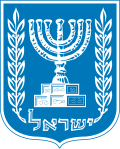| State of Israel |
|---|
 |
The following is a list of Israeli politicians who are notable enough for Wikipedia articles.
Contents
See also: List of Israelis
This is a dynamic list and may never be able to satisfy particular standards for completeness. You can help by adding missing items with reliable sources.